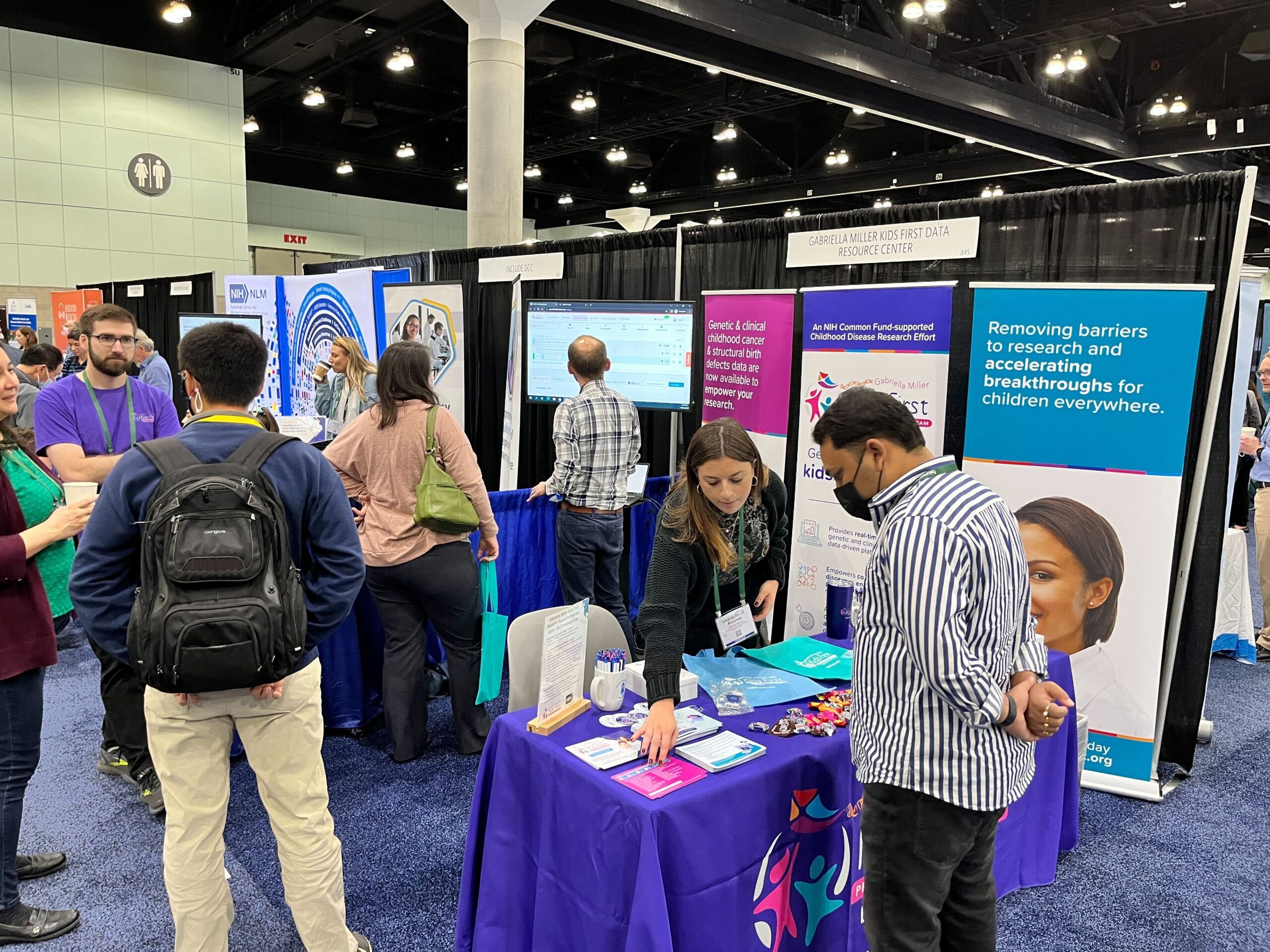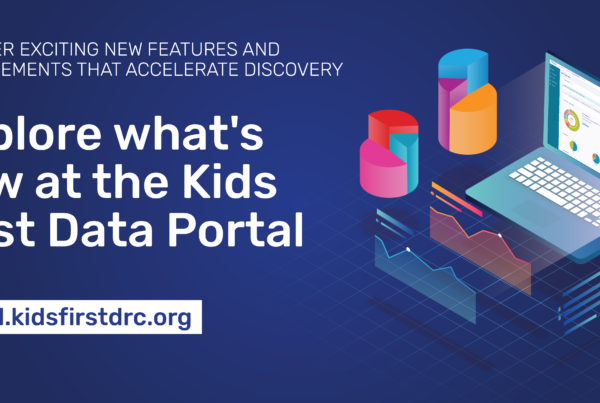The Gabriella Miller Kids First DRC Partners with the NIH INCLUDE Project to Share Latest Research Breakthroughs at the 2022 ASHG Annual Meeting
At the Annual Meeting of the American Society of Human Genetics (ASHG), the Kids First DRC partnered with the NIH’s INCLUDE (INvestigation of Co-occuring conditions across the Lifespan to Understand Down syndromE) Program to host a special networking event and poster session to showcase different facets of research across disease areas within the Kids First and INCLUDE programs.
The event, held on October 25 at the JW Marriott LA Live Hotel, featured more than 30 research projects across the NIH Kids First and INCLUDE programs. With roughly 200 event attendees hailing from 15 countries across 5 continents, this ancillary ASHG event was a truly global display of the power of collaborative science to improve the lives of children and adults with unique and complex health needs.
ASHG is the premiere professional membership organization for human genetics specialists worldwide, including nearly 8,000 members. Each year, the organization’s Annual Meeting represents the largest gathering of human genetics experts in the world.
The 2022 ASHG Annual Meeting, held from October 25 to 29 at the Los Angeles Convention Center in Los Angeles, CA, drew a crowd of more than 7,000 attendees, representing foundations and patient advocates, research labs, medical institutions, data scientists, public health agencies, and industry professionals across 84 countries. This diverse collection of human genetics stakeholders gathered to contribute their knowledge and insights toward advancing our global understanding of the human genome and to utilize that knowledge toward advancing medical science for the benefit of children and adults the world over.
The NIH Common Fund-supported Gabriella Miller Kids First Data Resource Center (Kids First DRC) once again participated in this important conference, held in-person for the first time since 2019, and used the opportunity to host an exhibitor’s booth to share how the Kids First DRC is working with researchers around the globe to advance new scientific discoveries on behalf of children and adolescents with cancer and structural birth defects.
In addition to presenting research projects empowered by the Kids First and INCLUDE programs, DRC staff and lead investigators were also on site to provide event attendees with a number of opportunities to learn more about the data and other resources available. These included live Kids First Data Resource Portal and INCLUDE Data Hub demonstrations presented by our teams of data experts; a Scholar Bar, where the NIH Office of Data Science and Sharing’s Senior Data Strategist, Dr. Anne Deslattes Mays provided guidance on how best to harness Kids First and INCLUDE tools to advance research; as well as ample opportunities to meet with NIH program officers and operations staff across the two programs.
Refreshments for the Kids First & INCLUDE Networking Event and Poster Session were generously provided by Children’s Hospital of Philadelphia’s Division of Neurosurgery.
Look below for a complete list of all research projects presented
INCLUDE POSTERS
(INvestigation of Co-occuring conditions across the Lifespan to Understand Down syndrome)
Kimberly Aldinger, Seattle Children’s Research Institute
A developmental transcriptomic atlas of Down syndrome
I.G. Phelps, C. Spurrell, A. Gogate, L. Starita, C. Trapnell, J. Shendure, D. Doherty, I.A. Glass, K.A. Aldinger
Soula Danopoulos; The Lundquist Institute for Biomedical Innovation at Harbor – UCLA
Transcriptional characterization suggests accelerated epithelial differentiation in Trisomy 21 Lungs
S. Danopoulos, S. Bhattacharya, C. Cherry, G. Deutsch, T. Mariani, D. Al Alam
Joaquin Espinosa; Linda Crnic Institute for Down Syndrome at the University of Colorado Anschutz Medical Campus
H. Lyford, R. Granrath, K. Smith, K. Kinning, M. Galbraith, J. Shaw, B. Enriquez Estrada, A. Rachubinski, K. Worek, K.D. Sullivan, J.M. Espinosa
Joaquin Espinosa; Linda Crnic Institute for Down Syndrome at the University of Colorado Anschutz Medical Campus
Multi-lineage immune hypersensitivity to IL- 10 in people with Trisomy 21
E.C. Britton, K.P. Smith, K.A. Waugh, P. Araya, R.E. Granrath, B. Enriquez Estrada, A.L. Rachubinski, K.D. Sullivan, J.M. Espinosa
Joaquin Espinosa; Linda Crnic Institute for Down Syndrome at the University of Colorado Anschutz Medical Campus
Cellular differences among cardiac cells from Down syndrome
R.S. Reeser, M.C. VeDepo, B. Pena, J.M. Espinosa, J.G. Jacot
Joaquin Espinosa; Linda Crnic Institute for Down Syndrome at the University of Colorado Anschutz Medical Campus
Liver Dysfunction in Down syndrome
L.N. Dunn, K.T. Kinning, N.P. Eduthan, K.A. Waugh, P. Araya, K. Schade, K.P. Smith, R. Granrath, A. Rachubinski, M.D. Galbraith, J.M. Espinosa, K.D. Sullivan
Joaquin Espinosa; Linda Crnic Institute for Down Syndrome at the University of Colorado Anschutz Medical Campus
Differential molecular and cellular changes in children and adults with Down syndrome
N.P. Eduthan, M.D. Galbraith, K.P. Smith, A. Rachubinski, P. Araya, K. Waugh, B. Enriquez Estrada, K. Worek, R.E. Granrath, K.T. Kinning, K.D. Sullivan, J.M. Espinosa
Joaquin Espinosa; Linda Crnic Institute for Down Syndrome at the University of Colorado Anschutz Medical Campus
Characterizing clonal hematopoiesis in people with Down syndrome
E.J. Evans Jr., R. Granath, K. Smith, A. Thorburn, J.M. Espinosa, J. DeGregori
Joaquin Espinosa; Linda Crnic Institute for Down Syndrome at the University of Colorado Anschutz Medical Campus
Defining the impact of Down syndrome on neuroinflammation in a mouse model of Alzheimer’s Disease
P. Araya, Kyndal A. Schade, K.A. Waugh, L.N. Dunn, N. Busquet, C. Brindley, H.R. Lyford, E.C. Britton, C. Winkler, J. Siegenthaler, J.M. Espinosa, K.D. Sullivan
Joaquin Espinosa; Linda Crnic Institute for Down Syndrome at the University of Colorado Anschutz Medical Campus
Interferon receptor gene dose determines diverse hallmarks of Down syndrome
L.A. Gillenwater, J.M. Espinosa, J.C. Costello
Joaquin Espinosa; Linda Crnic Institute for Down Syndrome at the University of Colorado Anschutz Medical Campus
K.A Waugh, R. Minter, J. Baxter, C. Chi, K.D. Tuttle, N.P Eduthan, M.D. Galbraith, K.T. Kinning, Z. Andrysik, P. Araya, H. Dougherty, L.N. Dunn, M. Ludwig, K.A. Schade, D. Tracy, K.P. Smith, R.E. Granrath, N. Busquet, S. Khanal, R.D. Anderson, L.L. Cox, B. Enriquez Estrada, A.L. Rachubinski, H.R. Lyford, E.C. Britton, D.J. Orlicky, J.L. Matsuda, K. Song, T.C. Cox, K.D. Sullivan, J.M. Espinosa
Adam Resnick; Center for Data Driven Discovery in Biomedicine, Children’s Hospital of Philadelphia
A. Resnick, J.M. Espinosa, B. O’Connor, J. DiGiovanna, V. Ferretti, R. CarrolI, M. Haendel, B. Farrow, H. Sanders, J.P. Thibert, K. Flynn, M. Mattioni
Huiqing Li; National Institutes of Health
H. Li
KIDS FIRST POSTERS
(Gabriella Miller Kids First Pediatric Research Program)
Azeez Alade; University of Iowa
A. Alade, N. Mukhopadhyay, E. Zeng, M. Withanage, W. Awotoye, A. Oladayo, T. Busch, V. Sule, L. Gowans, P. Mossey, M. Eshete, W. Adeyemo, A. Adeyemo, J. Murray, S. Weinberg, M. Marazita, A. Butali
Gabrielle Altman; Icahn School of Medicine at Mount Sinai
Analysis of pathogenic tandem repeat variation in congenital disorders
G. Altman, W. Lee, B. Jadhav, A. Martin Trujillo, A. J. Sharp
Eric Bogenschutz; The Jackson Laboratory
E. Bogenschutz, S. Brown, C. Heffner, C. Carpenter, K. Palmer, K. Peterson, K. Snow, Y. Shen, F. High, P. Donahoe, W.K. Chung, S.A. Murray
Yiran Guo; Center for Data Driven Discovery in Biomedicine, Children’s Hospital of Philadelphia
Y. Guo, J. Costanza, A. Resnick, V. Ferretti
Namrata Gupta; Broad Institute
Whole genome sequencing in support of the Gabriella Miller Kids First Pediatric Research Program
N. Gupta, K. Garimella, K. Larsson, S. McDonough, A. O’Donnell-Luria, M. Talkowski, S. Gabriel
David Higgins; Center for Data Driven Discovery in Biomedicine, Children’s Hospital of Philadelphia
Gabriella Miller Kids First Data Resource Center
D. Higgins, J.P. Thibert, M. Mattioni, J. DiGiovanna, R. Grossman, S. L. Volchenboum, D. M. Taylor, V. Ferretti, A. Heath, A. Resnick
Daniel Miller; Center for Data Driven Discovery in Biomedicine, Children’s Hospital of Philadelphia
D. Miller, M. Brown, Y. Zhu, B. Zhang, D. Higgins, B. Farrow, M. Mattioni, Z. Li, K. Wang, A. Heath, A. Resnick
Renan Martin; Johns Hopkins School of Medicine
R. Martin, E. Wohler, N. Sobreira
Sarah Morton; Boston Children’s Hospital; Harvard Medical School
Transcriptome analyses of congenital heart disease tissue from participants with Trisomy 21
S.U. Morton, D.M. McKean, P. Narayan, D. Reichart, D.M. DeLaughter, H. Wakimoto, J.M. Gorham, D. Quiat, Q. Zhang, V. Strohmenger, K. Brown, B. McDonough, J.A. Willcox, C.A. Gifford, T. Yvanka de Soysa, M. Young Jang, B.G. Bruneau, S.R. DePalma, T. Ward, D. Bernstein, M. Brueckner, B.D. Gelb, E. Goldmuntz, R.P. Lifton, J.W. New- burger, A.E. Roberts, H.J. Yost, M. Tristani-Firouz, A.G. Robling, R.N. Mitchell, W.K. Chung, R. Kim, J. Cleveland, J.G. Seidman, C.E. Seidman
Anthony Nguyen; University of Michigan Medical School
Genomic etiologies of CHARGE syndrome, related conditions and structural anomalies
A. Nguyen, A. Guxholli, A. Moccia, J. Kidd, S. Bielas, D. Martin
Abimbola Oladayo; University of Iowa
A.M. Oladayo, S. Prochaska, T. Busch, W.L. Adeyemo, Lord J.J. Gowans, M. Eshete, W. Awotoye, A. Alade, A.A. Adeyemo, P.A. Mossey, A. Prince, J.C. Murray, A. Butali
Lu Qiao; Columbia University Irving Medical Center
Integrated genetic analysis of transcriptome sequencing data in congenital diaphragmatic hernia
L. Qiao, H. Zhao, R. Hernan, E. Byington, G. Zhong, J. Wynn, L. Yu, X. Zhou, D. Potoka, A. Wagner, B. Warner, G. Mychaliska, M. Danko, D. Chung, R. Cusick, T. Crombleholme, F. Lee, G. Aspelund, V. Duron, Y. Shen, W. Chung;
Archana Rai; University of Texas Health Science Center, Houston
A. Rai, J.E. Posey, P.J Lupo, Z.C. Akdemir
Hila Milo Rasouly; Columbia University
A new approach to assess the allele frequency of small insertions and deletions
H.M. Rasouly, S. Bheda, S. Babu, K. Murthy, A.G. Gharavi
Patricia Sullivan; Children’s Cancer Institute
P. Sullivan, M. Cowley, on behalf of the Zero Childhood Cancer Program and the Computational Biology Group
Stephanie Ware; Indiana University
Genomic analysis of laterality birth defects
A. Haaning, A. Sridhar, L. Elmore, S. Ware










